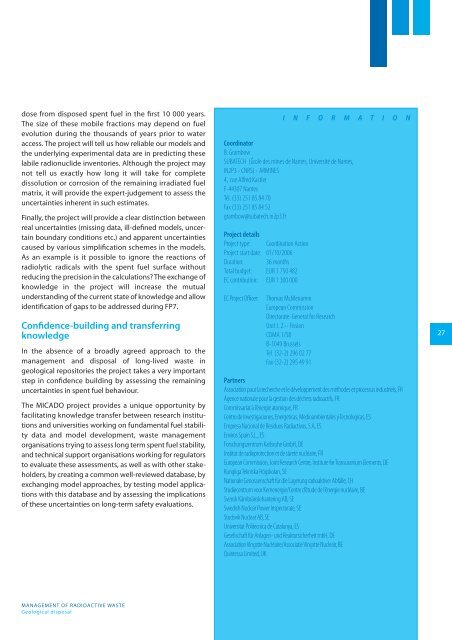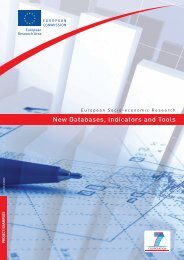Euratom FP6 Research Projects and Training Activities Volume III
Euratom FP6 Research Projects and Training Activities Volume III
Euratom FP6 Research Projects and Training Activities Volume III
Create successful ePaper yourself
Turn your PDF publications into a flip-book with our unique Google optimized e-Paper software.
dose from disposed spent fuel in the first 10 000 years.<br />
The size of these mobile fractions may depend on fuel<br />
evolution during the thous<strong>and</strong>s of years prior to water<br />
access. The project will tell us how reliable our models <strong>and</strong><br />
the underlying experimental data are in predicting these<br />
labile radionuclide inventories. Although the project may<br />
not tell us exactly how long it will take for complete<br />
dissolution or corrosion of the remaining irradiated fuel<br />
matrix, it will provide the expert-judgement to assess the<br />
uncertainties inherent in such estimates.<br />
Finally, the project will provide a clear distinction between<br />
real uncertainties (missing data, ill-defined models, uncertain<br />
boundary conditions etc.) <strong>and</strong> apparent uncertainties<br />
caused by various simplification schemes in the models.<br />
As an example is it possible to ignore the reactions of<br />
radiolytic radicals with the spent fuel surface without<br />
reducing the precision in the calculations? The exchange of<br />
knowledge in the project will increase the mutual<br />
underst<strong>and</strong>ing of the current state of knowledge <strong>and</strong> allow<br />
identification of gaps to be addressed during FP7.<br />
Confidence-building <strong>and</strong> transferring<br />
knowledge<br />
In the absence of a broadly agreed approach to the<br />
management <strong>and</strong> disposal of long-lived waste in<br />
geological repositories the project takes a very important<br />
step in confidence building by assessing the remaining<br />
uncertainties in spent fuel behaviour.<br />
The MICADO project provides a unique opportunity by<br />
facilitating knowledge transfer between research institutions<br />
<strong>and</strong> universities working on fundamental fuel stability<br />
data <strong>and</strong> model development, waste management<br />
organisations trying to assess long term spent fuel stability,<br />
<strong>and</strong> technical support organisations working for regulators<br />
to evaluate these assessments, as well as with other stakeholders,<br />
by creating a common well-reviewed database, by<br />
exchanging model approaches, by testing model applications<br />
with this database <strong>and</strong> by assessing the implications<br />
of these uncertainties on long-term safety evaluations.<br />
MANAGEMENT OF RADIOACTIVE WASTE<br />
Geological disposal<br />
I N F O R M A T I O N<br />
Coordinator<br />
B. Grambow<br />
SUBATECH (École des mines de Nantes, Université de Nantes,<br />
IN2P3 - CNRS) - ARMINES<br />
4, rue Alfred Kastler<br />
F-44307 Nantes<br />
Tel. (33) 251 85 84 70<br />
Fax (33) 251 85 84 52<br />
grambow@subatech.in2p3.fr<br />
Project details<br />
Project type: Coordination Action<br />
Project start date: 01/10/2006<br />
Duration: 36 months<br />
Total budget: EUR 1 750 482<br />
EC contribution: EUR 1 300 000<br />
EC Project Officer: Thomas McMenamin<br />
European Commission<br />
Directorate-General for <strong>Research</strong><br />
Unit J. 2 – Fission<br />
CDMA 1/58<br />
B-1049 Brussels<br />
Tel. (32-2) 296 02 77<br />
Fax (32-2) 295 49 91<br />
Partners<br />
Association pour la recherche et le développement des méthodes et processus industriels, FR<br />
Agence nationale pour la gestion des déchets radioactifs, FR<br />
Commissariat à l’énergie atomique, FR<br />
Centro de Investigaciones, Energeticas, Medioambientales y Tecnologicas, ES<br />
Empresa Nacional de Residuos Radiactivos, S.A, ES<br />
Enviros Spain S.L., ES<br />
Forschungszentrum Karlsruhe GmbH, DE<br />
Institut de radioprotection et de sûreté nucléaire, FR<br />
European Commission, Joint <strong>Research</strong> Centre, Institute for Transuranium Elements, DE<br />
Kungliga Tekniska Högskolan, SE<br />
Nationale Genossenschaft für die Lagerung radioaktiver Abfälle, CH<br />
Studiecentrum voor Kernenergie/Centre d’étude de l’énergie nucléaire, BE<br />
Svensk Kärnbränslehantering AB, SE<br />
Swedish Nuclear Power Inspectorate, SE<br />
Studsvik Nuclear AB, SE<br />
Universitat Politecnica de Catalunya, ES<br />
Gesellschaft für Anlagen- und Reaktorsicherheit mbH, DE<br />
Association Vinçotte Nucléaire/Associatie Vinçotte Nucleair, BE<br />
Quintessa Limited, UK<br />
27



